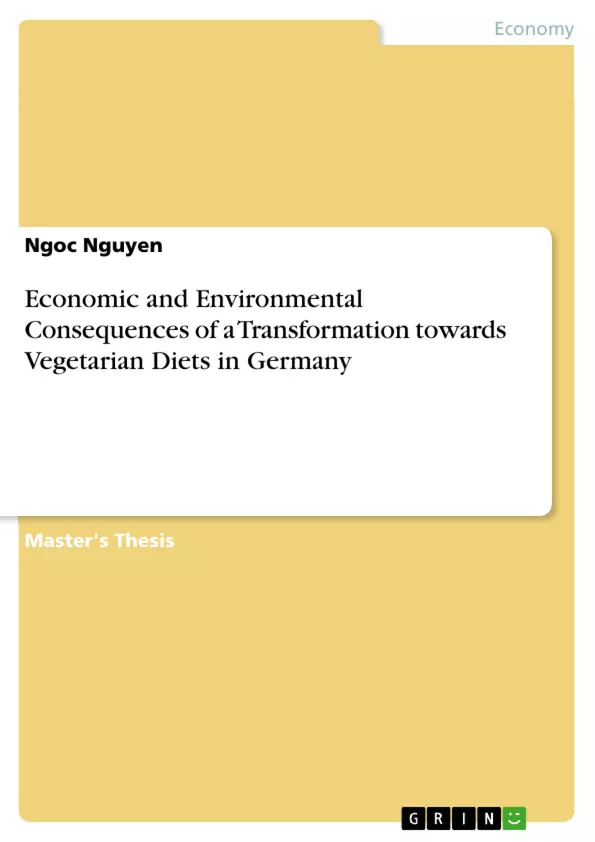This masterthesis considers and analyses the economic and environmental consequences of vegetarian diets in Germany.
The world is slowly but surely reaching the collective realization that an ecological catastrophe is inevitably which also leads to an economic and thus a social catastrophe. Sustainability, environmental protection and climate change are no longer niche topics. Environmental awareness is changing from individual lifestyle to social movement. Sustainability from consumer trend to economic factor. Environment is becoming a mainstream topic, a new criterion for good and bad, right and wrong. It is becoming the lowest common denominator for an entire generation. Everyone is affected, everyone must take a stand . In addition to these, the aspect of health is as well one of the most important Megatrends of our society today. The personal responsibility and health competence of the individual has increased - at the same time is health once again becoming more the responsibility of economy and politics. Because healthy or unhealthy environmental influences, food, or expenditures for medical facilities and education campaigns are not only subject to individual. In order to harmonize environment, society, economy and health, people have to change their way of consumption and the economy their way of production. A good foundation for this is provided by Nutrition Ecology, an interdisciplinary scientific discipline that attempts to balance all four dimensions.
The first part of the work presents the vegetarian diet, its history and the different forms and motivations. In addition current numbers and characteristics of vegetarians living in Germany are presented in the last part of Chapter 2. In Chapter 3 a comprehensive description of the current meat consumption and production in Germany and knowledge about the meat replacement market is presented. The environmental impact of the meat industry is discussed in detail in Chapter 4. And finally, in Chapter 5 a model is presented, Nutrition Ecology. Using the four dimensions, the impacts on economy and environment of a transformation towards vegetarian diets are shown.
Inhaltsverzeichnis (Table of Contents)
- Introduction
- Vegetarian Nutrition
- Sociological Meaning of Nutrition
- The Roots of Vegetarian Nutrition
- Terms and Definitions
- Forms of Vegetarianism
- Motives for Vegetarian Nutrition
- Vegetarians in Germany
- Food Situation in Germany
- Consumption
- Meat
- Fresh Milk and Fresh Milk Products
- Eggs
- Fish
- Production
- Meat
- Fresh Milk and Fresh Milk Products
- Eggs
- Fish
- Price Development and Agricultural Accounts
- Mass Production
- Feed in Livestock Production
- Production of Meat Substitutes - Market for Vegetarians
- Consumption
- Environmental Consequences of Livestock Farming
- Soil
- Ecological Agriculture
- Land Use
- Artificial Irrigation
- Overfertilization
- Deforestation and Soil Erosion
- Water
- Water Consumption
- Water Pollution
- Air
- Influence of Animal Foods
- Effects of Air Pollution
- Soil
- Nutrition Ecology: Impact of Vegetarian Diet
- Health
- Society
- Environment
- Economy
- Discussion
Zielsetzung und Themenschwerpunkte (Objectives and Key Themes)
This Master's thesis analyzes the economic and environmental consequences of a transition towards vegetarian diets in Germany. It explores the current state of vegetarianism in Germany, investigates the food situation within the country, and examines the environmental implications of livestock farming.
- The role of vegetarianism in Germany's food system
- Environmental impact of livestock farming
- Economic considerations related to a shift towards vegetarian diets
- The impact of such a transition on various aspects of society
- Potential benefits and challenges of promoting vegetarianism in Germany
Zusammenfassung der Kapitel (Chapter Summaries)
The introduction sets the stage for the thesis, outlining the research objectives and the importance of the topic. Chapter 2 provides a comprehensive overview of vegetarian nutrition, encompassing its sociological significance, historical roots, different forms, and motivations for adopting a vegetarian lifestyle. The chapter further explores the prevalence of vegetarianism in Germany. Chapter 3 focuses on the current food situation in Germany, analyzing consumption patterns of various food groups, including meat, dairy, eggs, and fish. It delves into the production aspects of these food groups and their associated price developments. Chapter 4 delves into the environmental consequences of livestock farming, examining its impact on soil, water, and air. It explores the issues of land use, water consumption, water pollution, and air pollution caused by animal agriculture. Chapter 5 investigates the implications of a vegetarian diet on various aspects of society, including health, social well-being, environmental impact, and economic aspects.
Schlüsselwörter (Keywords)
The key terms and focal points of this research are: vegetarianism, livestock farming, food consumption, environmental impact, sustainability, economic consequences, Germany, social implications, nutrition ecology, and policy implications.
- Arbeit zitieren
- Ngoc Nguyen (Autor:in), 2020, Economic and Environmental Consequences of a Transformation towards Vegetarian Diets in Germany, München, GRIN Verlag, https://www.grin.com/document/1438629



